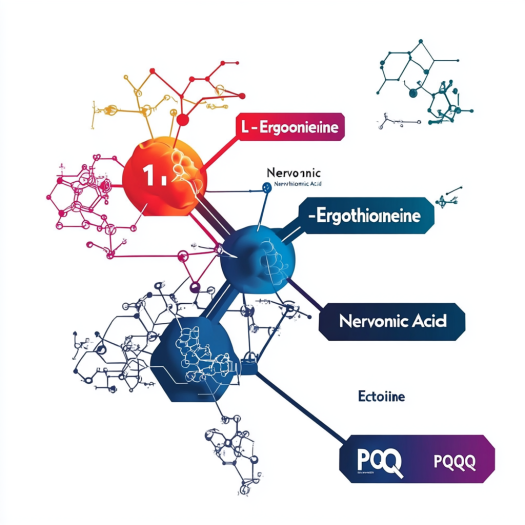
I’ve always been fascinated by how our brains work, especially when it comes to memory, clarity, and overall cognitive well-being.
Nervonic Acid is a special fatty acid linked to white matter support, helping maintain optimal brain structure, promote nerve regeneration, and improve cognitive resilience.
I still recall countless conversations with experts in the biotech realm, which sparked my deeper interest in Nervonic Acid.
Why Focus on White Matter with Nervonic Acid?
Our brain’s white matter is like the secret behind smooth neural communication.
White matter relies on essential lipids like Nervonic Acid to keep neural pathways intact, safeguard neurons, and potentially slow age-related decline.

I want to share a moment that triggered my curiosity: One afternoon, I was talking to a friend who works in neurology research, and he mentioned how white matter anomalies could affect daily life—things like forgetfulness, sluggish thinking, or even emotional imbalances. He recommended focusing on dietary choices that might strengthen this white matter. I started digging, and that’s when I realized how pivotal Nervonic Acid is. This remarkable lipid is found in our bodies, but often at levels that might benefit from a helpful supplement. From my role at Santa Biotech, I see how many in the supplement world are embracing it, especially in the United States, Europe, and Asia.
Brain Structure and Communication
The reason white matter is so important is that it holds those myelinated axons—imagine them as cables wrapped in protective insulation that speed up data transfer between brain cells. When that insulation, the myelin sheath, is damaged, communication can go haywire. That’s where Nervonic Acid comes in. It can act as a building block for these protective sheaths, giving your neurons that much-needed support.
Nervonic Acid’s Role in Myelin Health
Nervonic Acid helps form the foundation of your myelin sheaths. Think of it like bricks for a house: without the right materials, walls weaken. Similarly, inadequate Nervonic Acid can mean subpar insulation. Some folks say boosting Nervonic Acid in your diet might reinforce your white matter, giving your brain a bit of extra oomph.
Everyday Impact
What’s really compelling to me is the real-world difference. I’ve heard from some people who report feeling more mentally sharp, and while personal experiences vary, there’s a growing wave of interest in the research. Of course, the scientific community is still in the process of confirming precisely how effective it can be, but the anecdotal buzz alone is enough for me to keep exploring.
Quick Example: My Chat with Jerry
I often think about one of my typical customers, Jerry Li, a 54-year-old from the USA. When we first discussed Nervonic Acid, he immediately asked if it could help him regain the focus he used to have. It reminded me how many people, at various life stages, want to optimize brain health—sometimes out of worry, sometimes out of curiosity.
Potential Table for White Matter Insights
Below is a small table for clarity on what white matter does and how Nervonic Acid might help:
| White Matter Aspect | Possible Nervonic Acid Contribution |
|---|---|
| Myelin Sheath Integrity | Acts as a building block, aiding insulation |
| Neural Communication | May improve nerve signal speed and clarity |
| Aging Support | Possibly slows down certain age-related changes |
| Cognitive Function | Helps maintain memory and focus (still under research) |
It’s thrilling how nature can provide these essential pieces of our cellular puzzle. Since I work in a biotech environment, I witness first-hand how folks worldwide become increasingly open to the idea of layering nutritional support like Nervonic Acid into daily routines.
What Are the Key Benefits of Nervonic Acid for Brain Health?
We all want sharper thinking, better moods, and a strong memory.
Nervonic Acid is believed to assist myelin regeneration, promote healthy nerve signaling, and maintain strong cognitive processes throughout life’s many stages.
When I was younger, I never really considered brain supplements. But after I started working at Santa Biotech, I realized how critical these nutrients are, not just for older folks but for anyone dealing with a high-pressure routine, like students or busy professionals. It’s almost like the brain’s version of a spa day—supporting, nurturing, and refreshing neural pathways.
Boosting Cognitive Efficiency
Cognitive efficiency sounds fancy, but to me, it’s about having mental energy to respond effectively to daily challenges—whether it’s creative problem-solving at work or remembering tiny details. Some researchers propose that Nervonic Acid can help the brain run smoother, so to speak, by ensuring those myelin sheaths stay in top-notch shape.
Slowing Down Cognitive Decline
One big reason for the rising spotlight on Nervonic Acid is the possibility of slowing or mitigating aspects of cognitive decline. Of course, a single nutrient alone won’t magically roll back the clock, but incorporating substances like Nervonic Acid could be a piece of the puzzle. If we can protect neurons and maintain optimal signal speeds, we might just keep a clearer head as the years pass by.
Guarding Against Oxidative Stress
While we talk about Nervonic Acid primarily for white matter and nerve health, it doesn’t exist in isolation. Our line of products at Santa Biotech (like Ergothioneine or PQQ) also emphasizes antioxidant properties. Oxidative stress is basically a bully that attacks your cells, so combining multiple protective nutrients can give your cells a fighting chance. Think of them as an all-star team for cellular health.
Personal Anecdote from Work
I recall a customer who formulated a dietary supplement that combined Nervonic Acid with Ectoine for a skincare and nerve-health product. They were excited by how these ingredients might benefit both the brain and the skin, tying together holistic well-being. It reminded me that we often compartmentalize the body—brain here, skin there—but in reality, everything’s connected.
Balancing Expectations
All that said, I always encourage folks to keep expectations realistic. You won’t feel an overnight transformation from a single capsule. Supplements, including Nervonic Acid, are part of a broader lifestyle that might involve better sleep, stress management, and balanced nutrition. But hearing feedback from our customers, I sense that many experience a gradual improvement in focus and recall.
How Does Nervonic Acid Fit into a Holistic Lifestyle?
A healthy brain isn’t just about a single nutrient.
Combining Nervonic Acid with exercise, stress control, and balanced eating creates a comprehensive approach for nurturing both mental and physical health.
Here’s a little story: A while back, my neighbor had a phase of constant forgetfulness—losing keys, missing appointments, the usual chaos. She started a holistic health plan: moderate exercise, a more plant-focused diet, mindfulness sessions to combat stress, and a Nervonic Acid supplement. The results? She swears by an improved sense of clarity and steadiness in her day-to-day routine. While that’s one person’s experience, it resonates with a broader principle: synergy matters.

Embracing Movement
From my vantage point, any talk of boosting brain power must involve staying active. Light aerobic exercises and even short walks can enhance circulation, delivering more nutrients to your brain. The synergy between that improved blood flow and regular Nervonic Acid intake may help your mind feel more alert.
Stress Reduction Techniques
Chronic stress can chew away at mental health, sometimes even interfering with nerve function. Pairing mindfulness, yoga, or a simple break to breathe with a Nervonic Acid regimen might offer a buffer against daily stressors. I know for me, a quick five-minute break of slow breathing often helps me reset, especially on busy workdays.
Balanced Diet
I always return to the basics: a healthy diet with good proteins, fats, and a variety of veggies is a must. Supplements can fill the gaps, but they can’t replace real, whole foods. That’s why I champion the phrase “nutritional synergy.” Nervonic Acid becomes far more potent when it’s not fighting an uphill battle against junk foods and inadequate hydration.
The OEM Perspective
In my role as Marketing Director at Santa Biotech, I see a growing demand for products that approach wellness from multiple angles—think capsule combos featuring Nervonic Acid and other supportive nutrients for brain, immune, or even skin health. With our OEM services, clients often want that all-in-one formula. Holistic living is the new frontier, and from my perspective, it’s more than a passing trend.
Example Table: Lifestyle Integration
| Lifestyle Component | Connection to Nervonic Acid Support |
|---|---|
| Balanced Nutrition | Encourages overall synergy for brain function |
| Regular Exercise | Improves blood flow, aids nutrient delivery |
| Stress Management | Reduces cortisol, protecting nerve cells |
| Adequate Sleep | Helps with cellular repair and regeneration |
Where Does Nervonic Acid Come From?
I get asked a lot about the origin of Nervonic Acid—people always want to know if it’s ethical, sustainable, or effective.
Sourced commonly from rapeseed oil, our Nervonic Acid is produced through precision fermentation processes that meet global safety standards.
My involvement with Santa Biotech gave me an insider’s perspective. We use advanced technology to extract Nervonic Acid from rapeseed oil, ensuring purity and stability. And yes, we keep it solvent-free because nobody wants chemical residue lurking in their health supplements. We also do our best to maintain environmentally conscious methods—something that’s incredibly important to me personally.
The Fermentation Edge
Our approach at Santa Biotech goes beyond just pressing seeds. We leverage patented strain fermentation. That process adds an extra layer of consistency and often yields a more potent final product. While some might wonder, “Why not just get Nervonic Acid from food sources?”—the reality is that many everyday diets don’t provide optimal levels. We aim to fill that gap responsibly.
Bridging the Gap for Manufacturers
We serve a B2B wholesale model. Companies that produce dietary supplements, functional foods, or even pharmaceuticals look to us when they need a reliable Nervonic Acid source. Sometimes they want smaller batches for specialized lines; other times they need massive volumes. Our flexible production lines handle both, which is a point of pride for me.
A Quick Note on Compliance
One aspect I love about my job is ensuring we meet or exceed global regulatory standards. For instance, we’ve gone through tests confirming that our Nervonic Acid meets U.S. and EU guidelines. I believe transparency is the key. We provide documentation like Certificates of Analysis, so our partners see precisely what they’re getting—no hidden surprises.
Link to Our Product Page
I sometimes guide potential customers to read more about Nervonic Acid product page. There, we break down the science, show test results, and even share stories from global partners who’ve used it in their lines of brain health or neural-support products.
My Personal Connection
On a personal note, I grew up in a family that believed in the power of combining traditional remedies with modern science. That’s why I’m so passionate about sourcing Nervonic Acid in a clean, reliable way. It’s not just about selling an ingredient; it’s about creating a better path toward wellness for everyone.
Who Should Consider a Nervonic Acid Supplement?
I often see that spark in people’s eyes when they first learn about Nervonic Acid—like they’ve discovered a hidden gem.
People who want to support cognitive function, maintain healthy white matter, or fortify nerve health might benefit from a Nervonic Acid supplement.

Some folks assume it’s only for seniors. But I’ve noticed younger adults, especially high-performing professionals and students, also exploring these options. Anyone feeling mental fatigue or wishing for better focus might find Nervonic Acid intriguing. Sure, it’s not a magic fix, but it might be part of a thoughtful strategy for brain upkeep.
Beyond Age Stereotypes
At Santa Biotech, we supply raw materials for all sorts of brands—ones making products for older adults, yes, but also for mid-career professionals juggling multiple responsibilities, or even new parents who feel mentally drained. The diversity of clients reminds me that brain health is a shared concern across the board.
Pairing with Other Ingredients
Another interesting angle is how Nervonic Acid pairs with other nutrients like Ergothioneine, PQQ, or Ectoine. Sometimes, companies want to create a multi-purpose supplement that targets not just white matter but overall cellular vitality. For instance, a blend of Nervonic Acid and PQQ might appeal to those focusing on mitochondrial energy support as well as white matter health.
Jerry Li’s Perspective
I keep coming back to Jerry Li. He’s the exact type of client who recognized the synergy. He was initially interested in Nervonic Acid for nerve health but ended up combining it with Ectoine for an all-encompassing product. He said something that stuck with me: “Our minds and bodies are made of countless tiny parts—nurture them, and the whole system thrives.” Couldn’t have said it better myself.
Our OEM Services
For businesses or entrepreneurs reading this: we offer OEM services to craft your own line of supplements. That includes customizing Nervonic Acid dosages, pairing it with other natural fermentation-based antioxidants, or even packaging it in capsules, tablets, or powders. It’s a flexible approach that meets varying market demands—be it in the U.S., Europe, Japan, or elsewhere.
Dive into the Science
If you’re the type who loves reading research papers, there’s plenty of scientific literature on how Nervonic Acid influences nerve cell structures. While results can vary, it’s exciting to see global interest intensifying, with new studies popping up regularly. I’m personally eager to watch where the research takes us in the next few years.
Additional Considerations for Nervonic Acid Use
I’d be remiss not to address some practical questions. Let me expand on a few angles that frequently come up in conversation.
Dosage and Timing
People often wonder, “How much Nervonic Acid should I take?” Since I’m not a healthcare provider, I can’t prescribe an exact dose, but I always suggest starting with a modest amount and consulting a medical professional. Many existing supplements have guidelines on the bottle, typically ranging from a few milligrams up to a few hundred. Consistency is key. Taking Nervonic Acid for a week won’t do much; try it for a couple of months and evaluate.
Possible Side Effects
While Nervonic Acid is generally well-tolerated, no supplement is entirely free from potential side effects. Some individuals might experience mild digestive upset or skin sensitivities. If that happens, it’s wise to pause and talk to a healthcare expert.
Combining with Prescription Medications
Another question I get is whether Nervonic Acid interacts with prescription drugs. There isn’t a vast body of research on this yet, but caution is important. If you’re on medication for neurological or psychiatric conditions, definitely check with your doctor before adding any new supplement.
Understanding the Source
As I mentioned, we at Santa Biotech obtain our Nervonic Acid from rapeseed oil through a specialized fermentation-based approach. If you buy from other suppliers, you might see sources like certain fish or even animals, but I prefer plant-based because it typically aligns well with dietary restrictions and environmental consciousness.
Recap Table: Nervonic Acid Basics
| Key Point | Description |
|---|---|
| Primary Source | Rapeseed oil via fermentation |
| Main Benefit | Supports white matter, myelin sheath integrity |
| Typical Users | Seniors, professionals, students, health-conscious |
| Product Formats | Capsules, tablets, powders, gummies, etc. |
| Pairing Ingredients | PQQ, Ectoine, Ergothioneine, etc. |
All these considerations shape how Nervonic Acid fits into a bigger wellness puzzle. It’s not just a single star but part of an ensemble cast that includes lifestyle, diet, and possibly other supplements to bolster cognitive health.
Real-Life Applications and Future Outlook
While Nervonic Acid is not a newcomer to the nutrition scene, its popularity is definitely on the rise. I think it’s partly because people now appreciate how critical white matter is for day-to-day living. But let’s look deeper.
Cross-Industry Appeal
- Functional Foods: Imagine gummies fortified with Nervonic Acid. We’ve seen that concept gain traction. Busy folks love convenient options—grab-and-go formats that taste good and also help with mental clarity.
- Cosmetic Brands: Some brands experiment with Nervonic Acid-infused skincare. Although that’s still niche, the idea is that since Nervonic Acid supports cell membranes, it may have complementary effects on skin health.
- Pharmaceutical & Health Products: Companies are researching Nervonic Acid for specialized neurological applications. While that area often requires extensive clinical trials, I find it an intriguing frontier.
Market Drivers
From a global standpoint, interest in healthy aging is a big driver. As populations in the U.S., Japan, and parts of Europe grow older, demand for brain-support solutions skyrockets. Add younger consumers who are proactively seeking “brain hacks,” and you have a perfect storm boosting Nervonic Acid’s profile.
Why Santa Biotech Stands Out
Since I’m personally involved, I can’t help but talk about Santa Biotech’s approach. We care about natural, fermentation-based production—no synthetic solvents, no weird chemical aftertaste. Plus, everything we offer meets global compliance standards, from the FDA to EFSA. That consistency is vital for clients who ship products worldwide.
My Vision
If I could guess, I’d say Nervonic Acid might become a staple in more mainstream supplements soon. We’re already seeing it appear alongside well-known nutrients like Omega-3s. My hope is that as more research emerges, we’ll understand the full potential—and maybe develop even better ways to harness it, possibly through advanced synergy formulas.
Heartfelt Thought
I started out in marketing, but quickly realized I’m in the business of hope—providing people with resources that might enhance their quality of life. That feels meaningful to me. This blend of science, nature, and compassion is something I cherish in my daily work.
Conclusion
Nervonic Acid can be an incredible ally in supporting white matter and overall cognitive well-being.

